Gibb’s Cycle: Reflection on Occupational Therapy Assessment
VerifiedAdded on 2023/06/10
|5
|1077
|169
AI Summary
This article reflects on an occupational therapy assessment using Gibb’s cycle. It discusses the skills required for effective form fill-up and care plan development. The author identifies areas of improvement and outlines an action plan to develop necessary skills.
Contribute Materials
Your contribution can guide someone’s learning journey. Share your
documents today.
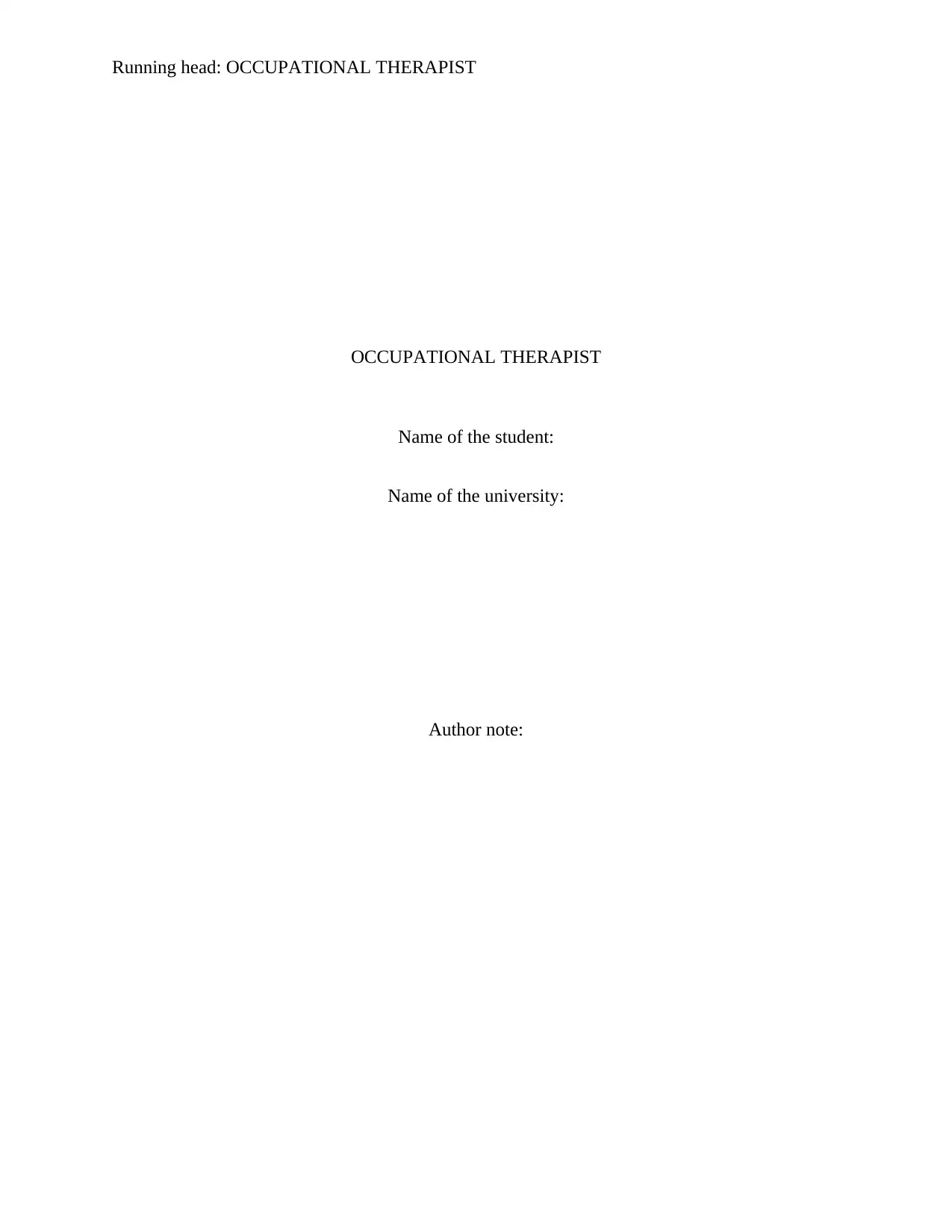
Running head: OCCUPATIONAL THERAPIST
OCCUPATIONAL THERAPIST
Name of the student:
Name of the university:
Author note:
OCCUPATIONAL THERAPIST
Name of the student:
Name of the university:
Author note:
Secure Best Marks with AI Grader
Need help grading? Try our AI Grader for instant feedback on your assignments.
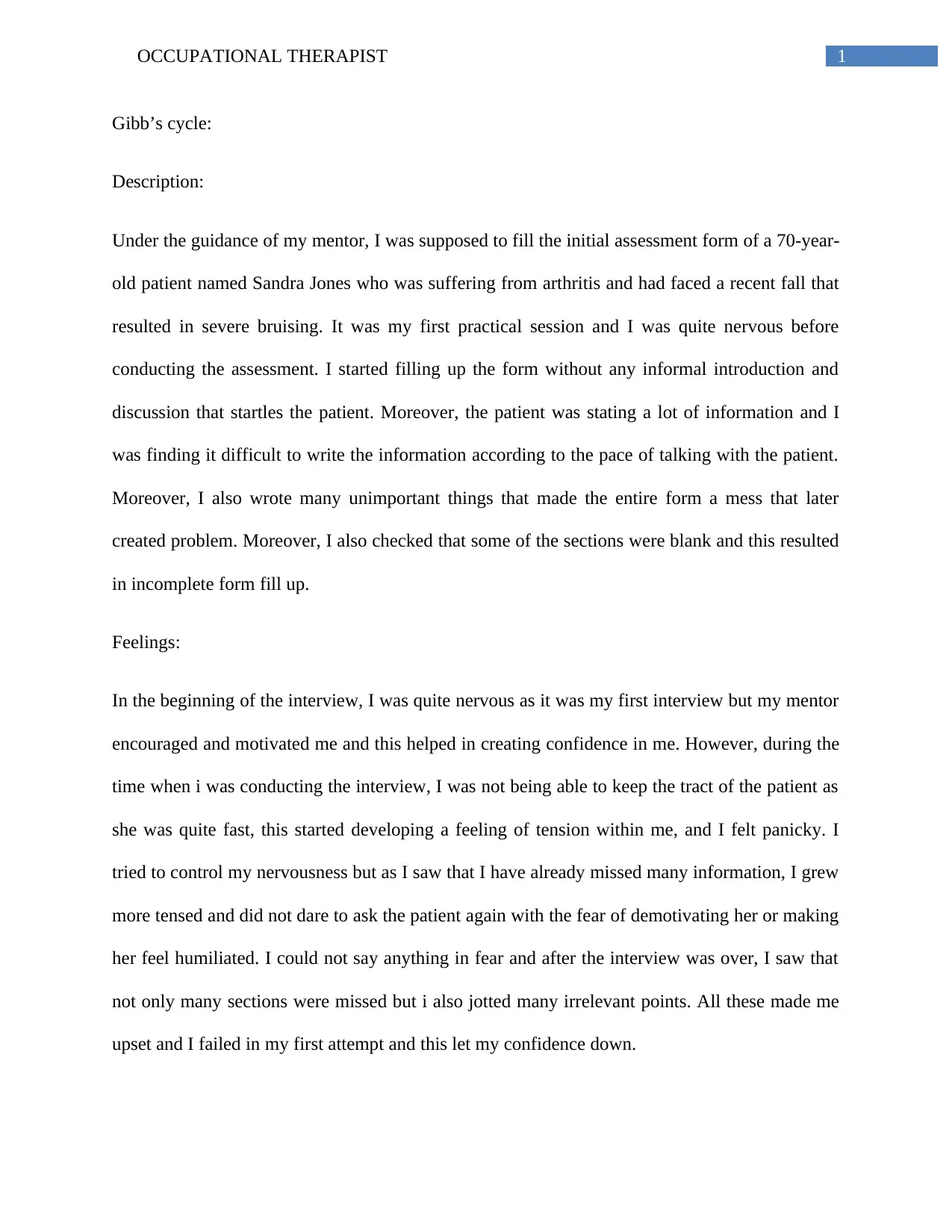
1OCCUPATIONAL THERAPIST
Gibb’s cycle:
Description:
Under the guidance of my mentor, I was supposed to fill the initial assessment form of a 70-year-
old patient named Sandra Jones who was suffering from arthritis and had faced a recent fall that
resulted in severe bruising. It was my first practical session and I was quite nervous before
conducting the assessment. I started filling up the form without any informal introduction and
discussion that startles the patient. Moreover, the patient was stating a lot of information and I
was finding it difficult to write the information according to the pace of talking with the patient.
Moreover, I also wrote many unimportant things that made the entire form a mess that later
created problem. Moreover, I also checked that some of the sections were blank and this resulted
in incomplete form fill up.
Feelings:
In the beginning of the interview, I was quite nervous as it was my first interview but my mentor
encouraged and motivated me and this helped in creating confidence in me. However, during the
time when i was conducting the interview, I was not being able to keep the tract of the patient as
she was quite fast, this started developing a feeling of tension within me, and I felt panicky. I
tried to control my nervousness but as I saw that I have already missed many information, I grew
more tensed and did not dare to ask the patient again with the fear of demotivating her or making
her feel humiliated. I could not say anything in fear and after the interview was over, I saw that
not only many sections were missed but i also jotted many irrelevant points. All these made me
upset and I failed in my first attempt and this let my confidence down.
Gibb’s cycle:
Description:
Under the guidance of my mentor, I was supposed to fill the initial assessment form of a 70-year-
old patient named Sandra Jones who was suffering from arthritis and had faced a recent fall that
resulted in severe bruising. It was my first practical session and I was quite nervous before
conducting the assessment. I started filling up the form without any informal introduction and
discussion that startles the patient. Moreover, the patient was stating a lot of information and I
was finding it difficult to write the information according to the pace of talking with the patient.
Moreover, I also wrote many unimportant things that made the entire form a mess that later
created problem. Moreover, I also checked that some of the sections were blank and this resulted
in incomplete form fill up.
Feelings:
In the beginning of the interview, I was quite nervous as it was my first interview but my mentor
encouraged and motivated me and this helped in creating confidence in me. However, during the
time when i was conducting the interview, I was not being able to keep the tract of the patient as
she was quite fast, this started developing a feeling of tension within me, and I felt panicky. I
tried to control my nervousness but as I saw that I have already missed many information, I grew
more tensed and did not dare to ask the patient again with the fear of demotivating her or making
her feel humiliated. I could not say anything in fear and after the interview was over, I saw that
not only many sections were missed but i also jotted many irrelevant points. All these made me
upset and I failed in my first attempt and this let my confidence down.
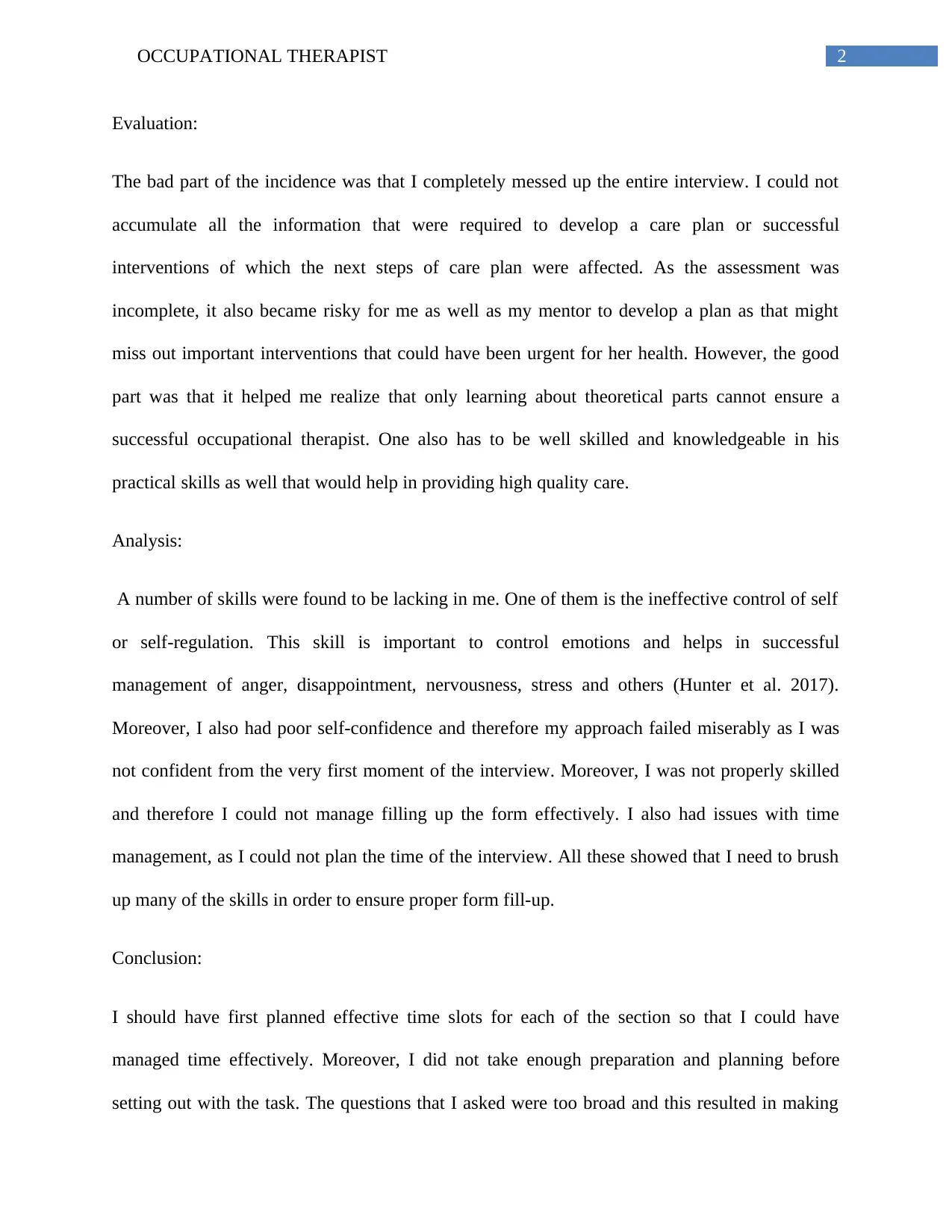
2OCCUPATIONAL THERAPIST
Evaluation:
The bad part of the incidence was that I completely messed up the entire interview. I could not
accumulate all the information that were required to develop a care plan or successful
interventions of which the next steps of care plan were affected. As the assessment was
incomplete, it also became risky for me as well as my mentor to develop a plan as that might
miss out important interventions that could have been urgent for her health. However, the good
part was that it helped me realize that only learning about theoretical parts cannot ensure a
successful occupational therapist. One also has to be well skilled and knowledgeable in his
practical skills as well that would help in providing high quality care.
Analysis:
A number of skills were found to be lacking in me. One of them is the ineffective control of self
or self-regulation. This skill is important to control emotions and helps in successful
management of anger, disappointment, nervousness, stress and others (Hunter et al. 2017).
Moreover, I also had poor self-confidence and therefore my approach failed miserably as I was
not confident from the very first moment of the interview. Moreover, I was not properly skilled
and therefore I could not manage filling up the form effectively. I also had issues with time
management, as I could not plan the time of the interview. All these showed that I need to brush
up many of the skills in order to ensure proper form fill-up.
Conclusion:
I should have first planned effective time slots for each of the section so that I could have
managed time effectively. Moreover, I did not take enough preparation and planning before
setting out with the task. The questions that I asked were too broad and this resulted in making
Evaluation:
The bad part of the incidence was that I completely messed up the entire interview. I could not
accumulate all the information that were required to develop a care plan or successful
interventions of which the next steps of care plan were affected. As the assessment was
incomplete, it also became risky for me as well as my mentor to develop a plan as that might
miss out important interventions that could have been urgent for her health. However, the good
part was that it helped me realize that only learning about theoretical parts cannot ensure a
successful occupational therapist. One also has to be well skilled and knowledgeable in his
practical skills as well that would help in providing high quality care.
Analysis:
A number of skills were found to be lacking in me. One of them is the ineffective control of self
or self-regulation. This skill is important to control emotions and helps in successful
management of anger, disappointment, nervousness, stress and others (Hunter et al. 2017).
Moreover, I also had poor self-confidence and therefore my approach failed miserably as I was
not confident from the very first moment of the interview. Moreover, I was not properly skilled
and therefore I could not manage filling up the form effectively. I also had issues with time
management, as I could not plan the time of the interview. All these showed that I need to brush
up many of the skills in order to ensure proper form fill-up.
Conclusion:
I should have first planned effective time slots for each of the section so that I could have
managed time effectively. Moreover, I did not take enough preparation and planning before
setting out with the task. The questions that I asked were too broad and this resulted in making
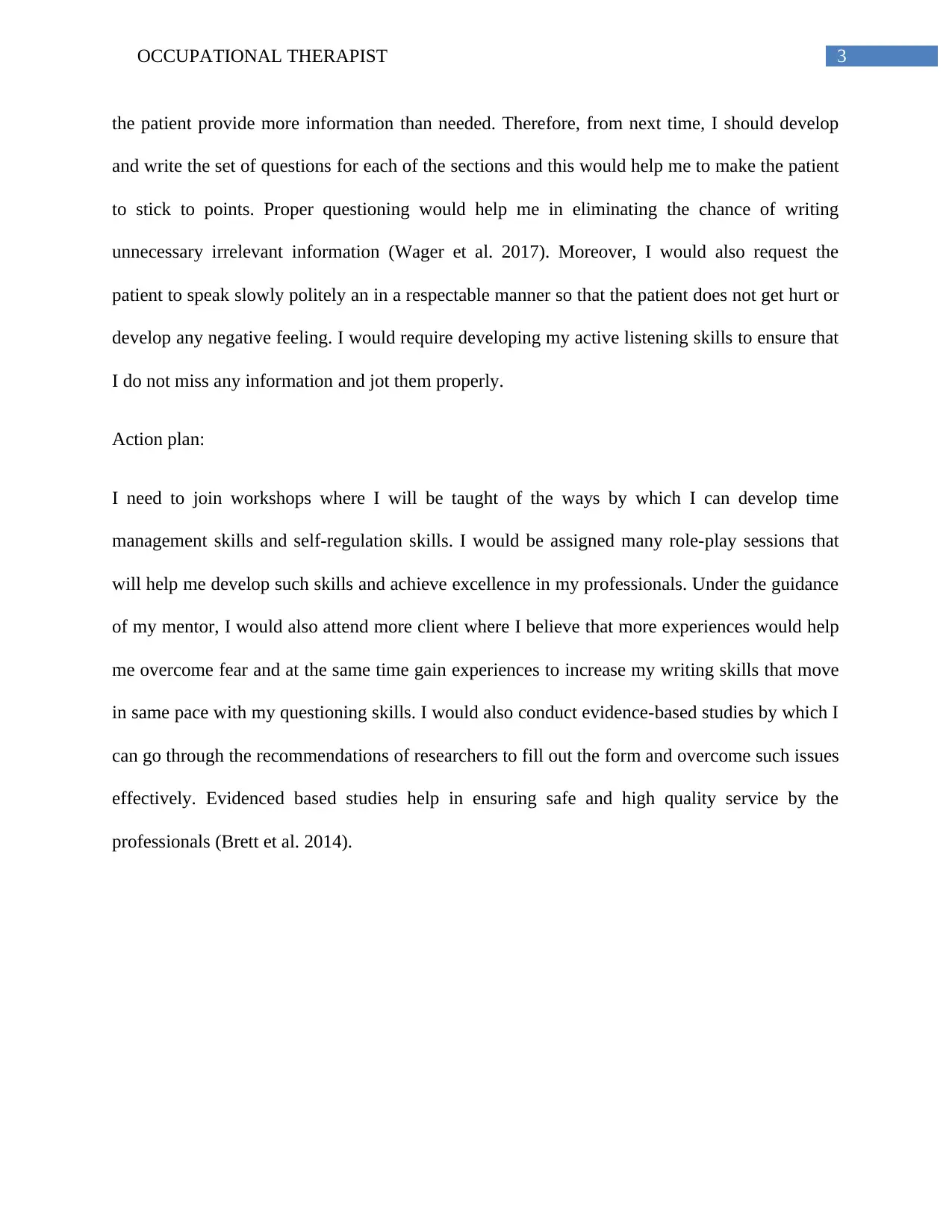
3OCCUPATIONAL THERAPIST
the patient provide more information than needed. Therefore, from next time, I should develop
and write the set of questions for each of the sections and this would help me to make the patient
to stick to points. Proper questioning would help me in eliminating the chance of writing
unnecessary irrelevant information (Wager et al. 2017). Moreover, I would also request the
patient to speak slowly politely an in a respectable manner so that the patient does not get hurt or
develop any negative feeling. I would require developing my active listening skills to ensure that
I do not miss any information and jot them properly.
Action plan:
I need to join workshops where I will be taught of the ways by which I can develop time
management skills and self-regulation skills. I would be assigned many role-play sessions that
will help me develop such skills and achieve excellence in my professionals. Under the guidance
of my mentor, I would also attend more client where I believe that more experiences would help
me overcome fear and at the same time gain experiences to increase my writing skills that move
in same pace with my questioning skills. I would also conduct evidence-based studies by which I
can go through the recommendations of researchers to fill out the form and overcome such issues
effectively. Evidenced based studies help in ensuring safe and high quality service by the
professionals (Brett et al. 2014).
the patient provide more information than needed. Therefore, from next time, I should develop
and write the set of questions for each of the sections and this would help me to make the patient
to stick to points. Proper questioning would help me in eliminating the chance of writing
unnecessary irrelevant information (Wager et al. 2017). Moreover, I would also request the
patient to speak slowly politely an in a respectable manner so that the patient does not get hurt or
develop any negative feeling. I would require developing my active listening skills to ensure that
I do not miss any information and jot them properly.
Action plan:
I need to join workshops where I will be taught of the ways by which I can develop time
management skills and self-regulation skills. I would be assigned many role-play sessions that
will help me develop such skills and achieve excellence in my professionals. Under the guidance
of my mentor, I would also attend more client where I believe that more experiences would help
me overcome fear and at the same time gain experiences to increase my writing skills that move
in same pace with my questioning skills. I would also conduct evidence-based studies by which I
can go through the recommendations of researchers to fill out the form and overcome such issues
effectively. Evidenced based studies help in ensuring safe and high quality service by the
professionals (Brett et al. 2014).
Secure Best Marks with AI Grader
Need help grading? Try our AI Grader for instant feedback on your assignments.
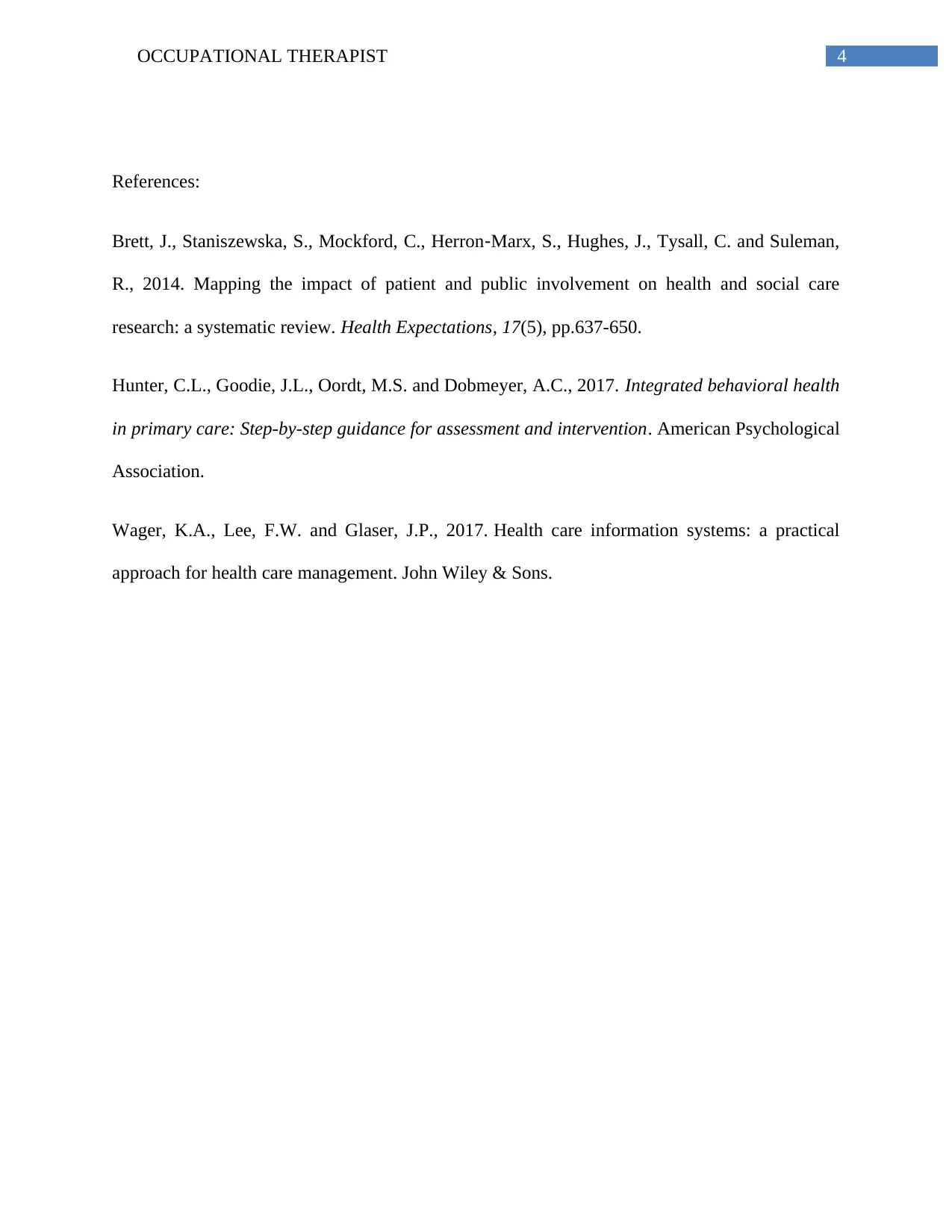
4OCCUPATIONAL THERAPIST
References:
Brett, J., Staniszewska, S., Mockford, C., Herron‐Marx, S., Hughes, J., Tysall, C. and Suleman,
R., 2014. Mapping the impact of patient and public involvement on health and social care
research: a systematic review. Health Expectations, 17(5), pp.637-650.
Hunter, C.L., Goodie, J.L., Oordt, M.S. and Dobmeyer, A.C., 2017. Integrated behavioral health
in primary care: Step-by-step guidance for assessment and intervention. American Psychological
Association.
Wager, K.A., Lee, F.W. and Glaser, J.P., 2017. Health care information systems: a practical
approach for health care management. John Wiley & Sons.
References:
Brett, J., Staniszewska, S., Mockford, C., Herron‐Marx, S., Hughes, J., Tysall, C. and Suleman,
R., 2014. Mapping the impact of patient and public involvement on health and social care
research: a systematic review. Health Expectations, 17(5), pp.637-650.
Hunter, C.L., Goodie, J.L., Oordt, M.S. and Dobmeyer, A.C., 2017. Integrated behavioral health
in primary care: Step-by-step guidance for assessment and intervention. American Psychological
Association.
Wager, K.A., Lee, F.W. and Glaser, J.P., 2017. Health care information systems: a practical
approach for health care management. John Wiley & Sons.
1 out of 5
Related Documents
Your All-in-One AI-Powered Toolkit for Academic Success.
+13062052269
info@desklib.com
Available 24*7 on WhatsApp / Email
![[object Object]](/_next/static/media/star-bottom.7253800d.svg)
Unlock your academic potential
© 2024 | Zucol Services PVT LTD | All rights reserved.





